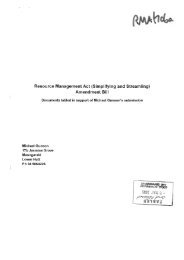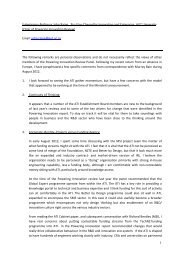Parliamentary Debates (Hansard) - New Zealand Parliament
Parliamentary Debates (Hansard) - New Zealand Parliament
Parliamentary Debates (Hansard) - New Zealand Parliament
Create successful ePaper yourself
Turn your PDF publications into a flip-book with our unique Google optimized e-Paper software.
16 May 2009 Local Government (Auckland Reorganisation) Bill 3643<br />
pushed through. We are being dictated to, and there is a lack of support, which will<br />
breed resentment in the community.<br />
This issue is also about the aims and aspirations of Māori people. I say to members<br />
that Māori aspire to be heard in their workplaces, to be influential. I struggle to see what<br />
is wrong with recognising the aims and the aspirations of Māori, the employment<br />
requirements of Māori, and the need for greater involvement of Māori in Auckland<br />
public affairs. I wonder why it is such a hard issue to deal with, why it is so hard to<br />
debate, why we have to push this bill through so quickly, and why Māori people do not<br />
have an opportunity to participate in any sort of debate on an issue that really does<br />
affect them, and to participate in settings that allow Māori to be heard. To have public<br />
meetings is fine, but I just wonder how many public meetings will be held on marae,<br />
and I wonder how many public meetings will be held at times when whānau can get to<br />
those meetings and actually contribute. It is really important that the aims and the<br />
aspirations of Māori people are not overlooked in this whole debate.<br />
One of the greatest aims and aspirations of Māori is simply to get a job. When we see<br />
that our unemployment rate is up at around 11 percent, which is higher than that of most<br />
groups aside from the Pacific Island population, we realise that it is really important that<br />
Māori rights and Māori conditions at work are considered and looked after. Again, this<br />
comes back to democracy. We hear National members say they are listening. But I ask<br />
whether they have heard what the people are saying. There is a big difference. When<br />
those members sit in a meeting and simply listen to what people are saying, and then<br />
move on in their own direction, they are not hearing what people are saying. People do<br />
not like the direction that all this is heading in.<br />
To come back to the issue of the Auckland Council being a good employer, I say that<br />
this is about people having an opportunity to be selected. What we are seeing here is<br />
that the Minister of Local Government will base his selection criteria on individuals or<br />
groups that support his ideology. That ideology is quite intimidating for the Māori<br />
people, because our values are totally different from those of the Minister. We have a<br />
fear that the people being selected will be mainly male, mainly wealthy, and mainly<br />
Pākehā. Let me tell members now that Māori are certainly not Pākehā. We are certainly<br />
not generally wealthy, and we certainly do not live in the suburbs of Remuera,<br />
Pakuranga, Howick, and those other places. We tend to be the people who live in west<br />
Auckland, Glenfield, Ōtara, and Māngere.<br />
Moana Mackey: They need a code of practice.<br />
KELVIN DAVIS: They do need a code of practice. The Minister must notify the<br />
House and make a workforce transition code of practice.<br />
Moana Mackey: Why do they oppose that?<br />
KELVIN DAVIS: Indeed—why do they oppose having a code of practice?<br />
Hon SHANE JONES (Labour): Kia ora nō tātou. Thank you very much for the<br />
opportunity to speak for the voices of Auckland that have been silenced as a<br />
consequence of the chilling erosion of democracy being orchestrated by Rodney Hide<br />
and Mr Brownlee this morning. It is good to see Mr Harawira back here after practising<br />
his salute with a Melanesian flavour to it.<br />
I stand to speak about the importance of the rights of those Aucklanders whose<br />
democratic entitlements have been swiped away as a consequence of the Auckland<br />
Transition Agency. Now we focus on their rights as employees. They cover a large and<br />
vast distance. My colleague earlier spoke about those who are disadvantaged, those who<br />
occupy marginal positions. Their level of irrelevance grows by the hour in the mind of<br />
the National Government. It does not care about people who do not have powerful<br />
friends in shiny towers. It does not care about people who do not belong to the chamber<br />
of commerce, who do not belong to other powerful professional organisations. All it






![Full evidence text [PDF 8908k] - New Zealand Parliament](https://img.yumpu.com/14025494/1/184x260/full-evidence-text-pdf-8908k-new-zealand-parliament.jpg?quality=85)
![−3 JUN 2009 IRELEASED] - New Zealand Parliament](https://img.yumpu.com/12829724/1/185x260/3-jun-2009-ireleased-new-zealand-parliament.jpg?quality=85)
![Full paper text [PDF 3515k] - New Zealand Parliament](https://img.yumpu.com/11267192/1/184x260/full-paper-text-pdf-3515k-new-zealand-parliament.jpg?quality=85)


![Full evidence text [PDF 9k] - Parliament](https://img.yumpu.com/7938085/1/184x260/full-evidence-text-pdf-9k-parliament.jpg?quality=85)





